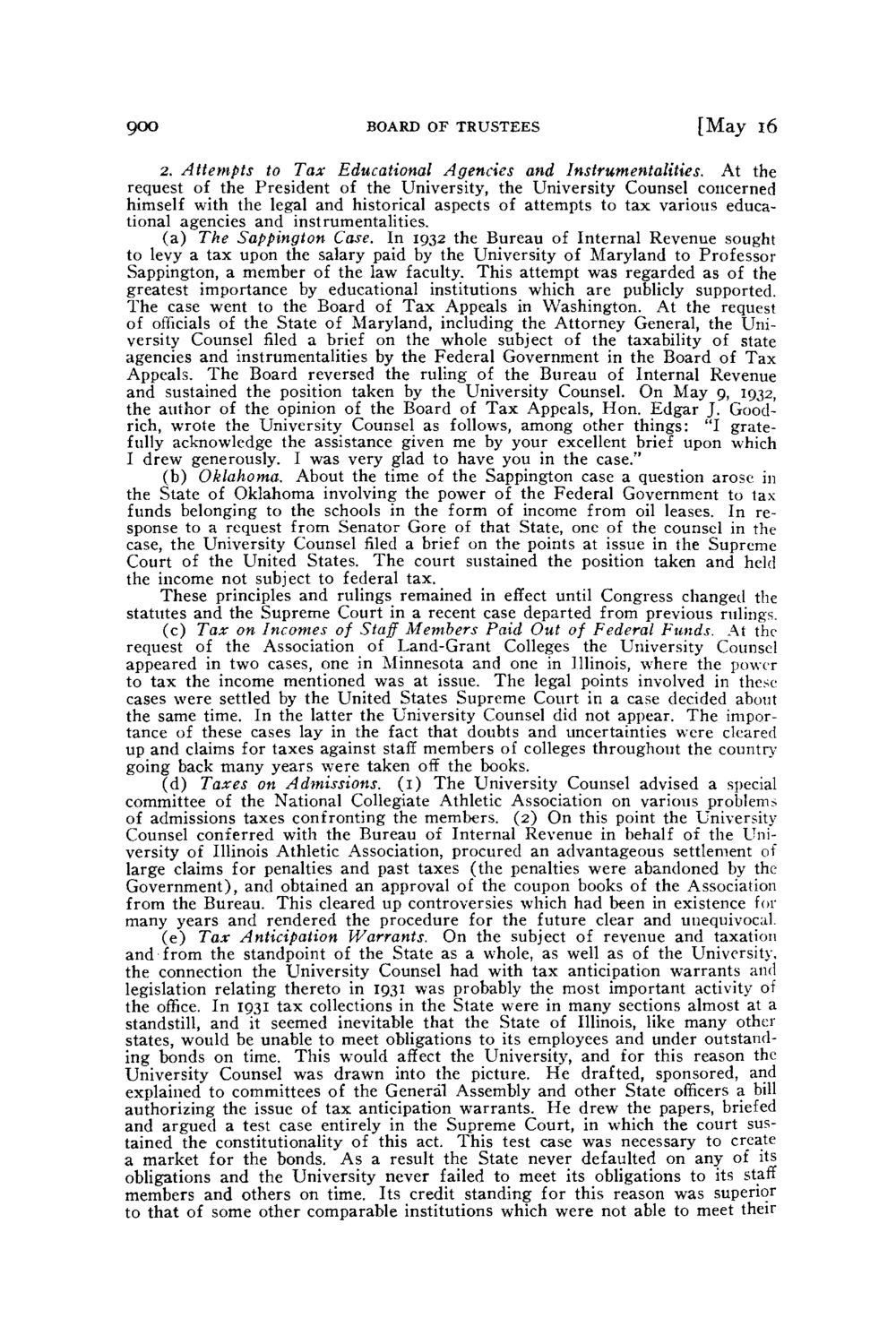| |
| |
Caption: Board of Trustees Minutes - 1942
This is a reduced-resolution page image for fast online browsing.

EXTRACTED TEXT FROM PAGE:
900 BOARD OF T R U S T E E S [May 16 2. Attempts to Tax Educational Agencies and Instrumentalities. At the request of the President of the University, the University Counsel concerned himself with the legal and historical aspects of attempts to tax various educational agencies and instrumentalities. ( a ) The Sappington Case. In 1932 the Bureau of Internal Revenue sought to levy a tax upon the salary paid by the University of Maryland to Professor Sappington, a member of the law faculty. This attempt was regarded as of the greatest importance by educational institutions which are publicly supported. The case went to the Board of T a x Appeals in Washington. At the request of officials of the State of Maryland, including the Attorney General, the University Counsel filed a brief on the whole subject of the taxability of state agencies and instrumentalities by the Federal Government in the Board of Tax Appeals. T h e Board reversed the ruling of the Bureau of Internal Revenue and sustained the position taken by the University Counsel. On May 9, 1932, the author of the opinion of the Board of T a x Appeals, Hon. Edgar J. Goodrich, wrote the University Counsel as follows, among other things: "I gratefully acknowledge the assistance given me by your excellent brief upon which I drew generously. I was very glad to have you in the case." (b) Oklahoma. About the time of the Sappington case a question arose in the State of Oklahoma involving the power of the Federal Government to tax funds belonging to the schools in the form of income from oil leases. In response to a request from Senator Gore of that State, one of the counsel in the case, the University Counsel filed a brief on the points at issue in the Supreme Court of the United States. T h e court sustained the position taken and held the income not subject to federal tax. These principles and rulings remained in effect until Congress changed the statutes and the Supreme Court in a recent case departed from previous rulings. (c) Tax on Incomes of Staff Members Paid Out of Federal Funds. At the request of the Association of Land-Grant Colleges the University Counsel appeared in two cases, one in Minnesota and one in Illinois, where the power to tax the income mentioned was at issue. T h e legal points involved in these cases were settled by the United States Supreme Court in a case decided about the same time. In the latter the University Counsel did not appear. T h e importance of these cases lay in the fact that doubts and uncertainties were cleared up and claims for taxes against staff members of colleges throughout the country going back many years were taken off the books. (d) Taxes on Admissions. (1) T h e University Counsel advised a special committee of the National Collegiate Athletic Association on various problems of admissions taxes confronting the members. (2) On this point the University Counsel conferred with the Bureau of Internal Revenue in behalf of the University of Illinois Athletic Association, procured an advantageous settlement of large claims for penalties and past taxes (the penalties were abandoned by the Government), and obtained an approval of the coupon books of the Association from the Bureau. This cleared up controversies which had been in existence for many years and rendered the procedure for the future clear and unequivocal. ( e ) Tax Anticipation Warrants. On the subject of revenue and taxation and from the standpoint of the State as a whole, as well as of the University, the connection the University Counsel had with t a x anticipation warrants and legislation relating thereto in 1931 was probably the most important activity of the office. In 1931 tax collections in the State were in many sections almost at a standstill, and it seemed inevitable that the State of Illinois, like many other states, would be unable to meet obligations to its employees and under outstanding bonds on time. This would affect the University, and for this reason the University Counsel was drawn into the picture. H e drafted, sponsored, and explained to committees of the General Assembly and other State officers a bill authorizing the issue of tax anticipation warrants. H e drew the papers, briefed and argued a test case entirely in the Supreme Court, in which the court sustained the constitutionality of this act. This test case was necessary to create a market for the bonds. A s a result the State never defaulted on any of its obligations and the University never failed to meet its obligations to its staff members and others on time. Its credit standing for this reason was superior to that of some other comparable institutions which were not able to meet their
| |